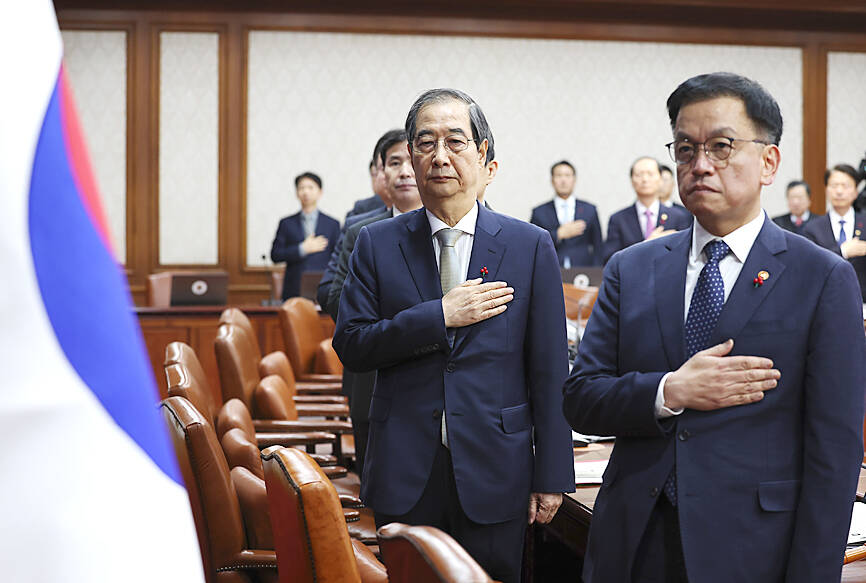South Korea’s main opposition party yesterday vowed to impeach South Korean Prime Minister and acting president Han Duck-soo, but reversed an earlier plan and would wait until later in the week, party officials said, as the risk of further political uncertainty heightened.
The move came as the country is reeling from impeached South Korean President Yoon Suk-yeol’s short-lived bid to impose martial law on Dec. 3, which he partly blamed on the opposition’s propensity to impeach government officials.
Opposition Democratic Party (DP) floor leader Park Chan-dae said the party would wait until later this week to decide whether to go ahead with the plan to impeach Han.

Photo: Yonhap news agency via AP
Earlier, the party said it would introduce a bill to impeach Han yesterday.
The DP, which has a majority in the South Korean National Assembly, is taking the step after Han postponed signing legislation to launch a special counsel investigation into Yoon’s failed bid to impose martial law.
It said Han was acting against the will of the people, effectively aiding Yoon, whose powers have been suspended after the legislature voted to impeach him on Dec. 14.
Once an impeachment bill is submitted then formally introduced at a plenary session, it must be voted on within 24 to 72 hours.
If Han is impeached, the finance minister would be next in line to lead the government as acting president, under South Korean law.
Han took over from the suspended Yoon, who faces a Constitutional Court review on whether to oust him or restore his powers.
“Acting president Han made it clear at today’s Cabinet meeting that he would not greenlight the special prosecution law,” Park said. “There is no way to interpret it other than that he is delaying.”
With its legislative majority, the DP passed bills this month to appoint a special counsel to pursue charges of insurrection, among others, against the conservative Yoon, and to investigate his wife over a luxury bag scandal and other allegations.

‘ABUSE OF POWER’: Lee Chun-yi allegedly used a Control Yuan vehicle to transport his dog to a pet grooming salon and take his wife to restaurants, media reports said Control Yuan Secretary-General Lee Chun-yi (李俊俋) resigned on Sunday night, admitting that he had misused a government vehicle, as reported by the media. Control Yuan Vice President Lee Hung-chun (李鴻鈞) yesterday apologized to the public over the issue. The watchdog body would follow up on similar accusations made by the Chinese Nationalist Party (KMT) and would investigate the alleged misuse of government vehicles by three other Control Yuan members: Su Li-chiung (蘇麗瓊), Lin Yu-jung (林郁容) and Wang Jung-chang (王榮璋), Lee Hung-chun said. Lee Chun-yi in a statement apologized for using a Control Yuan vehicle to transport his dog to a

Taiwan yesterday denied Chinese allegations that its military was behind a cyberattack on a technology company in Guangzhou, after city authorities issued warrants for 20 suspects. The Guangzhou Municipal Public Security Bureau earlier yesterday issued warrants for 20 people it identified as members of the Information, Communications and Electronic Force Command (ICEFCOM). The bureau alleged they were behind a May 20 cyberattack targeting the backend system of a self-service facility at the company. “ICEFCOM, under Taiwan’s ruling Democratic Progressive Party, directed the illegal attack,” the warrant says. The bureau placed a bounty of 10,000 yuan (US$1,392) on each of the 20 people named in

The High Court yesterday found a New Taipei City woman guilty of charges related to helping Beijing secure surrender agreements from military service members. Lee Huei-hsin (李慧馨) was sentenced to six years and eight months in prison for breaching the National Security Act (國家安全法), making illegal compacts with government employees and bribery, the court said. The verdict is final. Lee, the manager of a temple in the city’s Lujhou District (蘆洲), was accused of arranging for eight service members to make surrender pledges to the Chinese People’s Liberation Army in exchange for money, the court said. The pledges, which required them to provide identification

INDO-PACIFIC REGION: Royal Navy ships exercise the right of freedom of navigation, including in the Taiwan Strait and South China Sea, the UK’s Tony Radakin told a summit Freedom of navigation in the Indo-Pacific region is as important as it is in the English Channel, British Chief of the Defence Staff Admiral Tony Radakin said at a summit in Singapore on Saturday. The remark came as the British Royal Navy’s flagship aircraft carrier, the HMS Prince of Wales, is on an eight-month deployment to the Indo-Pacific region as head of an international carrier strike group. “Upholding the UN Convention on the Law of the Sea, and with it, the principles of the freedom of navigation, in this part of the world matters to us just as it matters in the